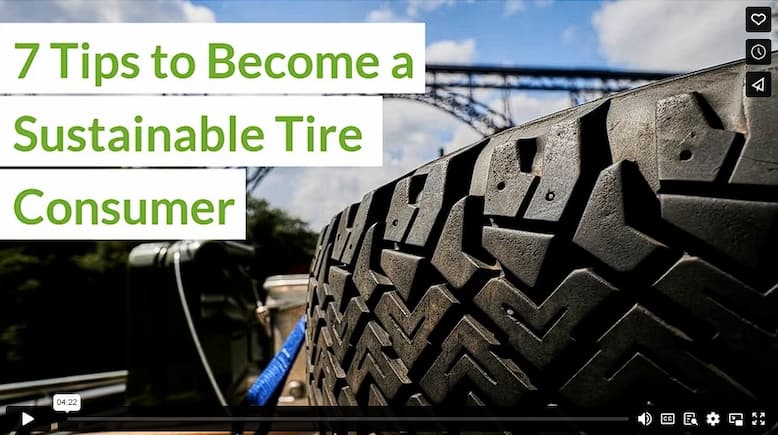Living an environmentally friendly lifestyle is an aspiration shared by millions of people around the world. Although climate change, ocean acidification, and deforestation feel like problems way out of our control, when enough people change little things about how they live and what they consume, we collectively realize the immense impacts we can have together.
Anyone who starts learning about sustainable consumerism is quickly brought up to speed on the benefits of a plant-based diet, the problems posed by plastic, and an overload of information about which clothing options are the classy “green” brands.
While most of this advice is well and good, a concerning amount of the dialogue deteriorates into greenwashing and rich people judging lower-income consumers for their choices in the checkout line. As it turns out, many things we use in daily life don’t fall under the categories of diet, apparel, and single-use plastics. One of those things is tires.
Becoming a sustainable tire consumer isn’t difficult, but since tires are fundamental to almost all of our transportation methods, using them sustainably makes an impact. Most of the following pointers come down to two fundamental principles, prolonging a tire’s lifespan on the road and supporting the tire recycling industry. To achieve these two goals, let’s take a look at a range of actionable tips:
Drive well
The best thing you can do to be a sustainable tire consumer is simply to drive well. Taking corners fast and braking hard wears out tires much quicker than gentle, controlled movements. Tire wear and tear is certainly not the only reason to drive safely or leave the house on time. But maybe thinking about the impact on your tires is just that extra bit of motivation you need to avoid rushed commutes. Your passengers will appreciate your sustainable tire consumption too.
Get your suspension alignment checked
Misaligned suspension leads to a car applying friction on the tires unevenly. Uneven friction causes the tire to degrade in one place and becomes unsafe for road use long before most of the tire is worn out.
Check your tires to see if there is a difference between the tread on the inside and outside. Ask the mechanic to ensure the alignment is correct every time you take your car in. Even minor adjustments can help tires last years longer.
Limit your time in the car
The less you drive, the less often your tires need to be replaced. This decreases how many tires you consume over your lifetime. If you’re able, try biking to work and events, timing how much longer it takes than a driving commute. Many people are surprised by how fast biking can be. You can bypass traffic and don’t have to spend time finding a parking spot.
Learn about tire recycling
Most people are completely unaware of what happens to tires once they wear out. As it turns out, the majority of them are recycled. Check out other articles on this blog to learn more about the wonderful world of tire recycling. Understanding how tires are recycled and what products are made from recycled tire rubber can inform further consumer choices and help you share the reasoning behind your choices with others.
Support recycled rubber products
Old tires are shredded by tire cutting equipment into tire-derived fuel, crumb rubber, and rubber powder. A variety of different manufacturers and industries use these various derivatives. Although some recycled tire products are only purchased by big companies to make asphalt and artificial turfs, some are available to everyday consumers, such as rubber mats and backyard landscaping materials.
Upcycle old tires
Not all tires make it to tire recycling plants. If you have some old tires lying around, try repurposing them into fun and creative upcycled equipment. Tires are perfect for making:
- Swings
- Hanging flower boxes
- Teeter totters
- Compost containers
A simple google search will give you a thousand options to consider, from playful to practical.
Start a tire recycling business
This last tip isn’t for everyone, but it is a more accessible entrepreneurial venture than many consider. The biggest barrier to entry is likely not knowing it is an option in the first place. All a tire recycling company needs is tire shredding equipment and tires to shred. Most people see end-of-life tires as large and cumbersome waste and are happy to offload them. Tire recycling can be a profitable business and lead to financial freedom, all while doing good for the environment.
Although being a sustainable tire consumer might not give you the same social credit as owning a Tesla or a wardrobe of hemp shirts, tires are a product we all consume daily. Being aware of this fact is an excellent step to being an intentional tire user. Rather than coming at the issues of greenhouse gas emissions and pollution with guilt for contributing to the problems, consumers should see what they buy and how they use it as a powerful way to help push the needle in the right direction. Why not start with tires?
Infographic
Living an eco-friendly lifestyle is a common goal, though daunting given climate change, ocean acidification, and deforestation. Yet, small changes matter when embraced collectively. Sustainable consumerism involves plant-based diets, reduced plastic use, and eco-friendly clothing, but tire consumption is vital too. Extending tire life and supporting recycling are key. Simple habits like monitoring pressure, rotating, and selecting retreaded tires help curb waste and emissions.

Video





